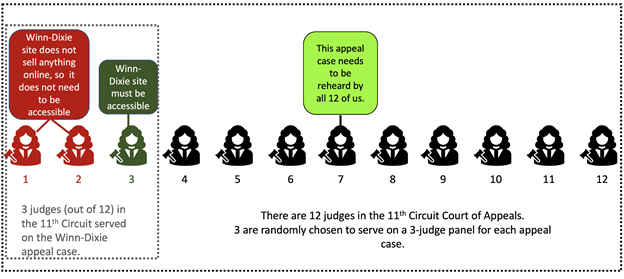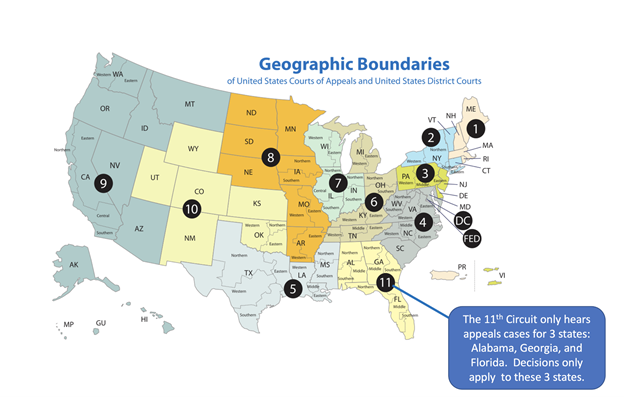7 Accessibility FAQ on the Winn-Dixie ADA Appeal Decision (2021)
Last month, on 4/7/2021 a single U.S. Court of Appeals (in the 11th Circuit) decided in a 2 to 1 split decision that Winn-Dixie’s website did not have to be accessible to people who are blind.
There have been 3 requests for the 11th Circuit to reconsider the 4/7/2021 Winn-Dixie decision. See “Could this decision be changed?” for more details.
1. Who made the ruling?
Only 3 judges (from the 11th Circuit) were on the panel for the 4/7/2021 Winn-Dixie appeal.
2 of the 3 judges said that because people could not buy anything on the Winn-Dixie website, it was not covered by the Americans with Disabilities Act (ADA). At the time the original case was filed, online shopping was not offered by Winn-Dixie. See “What if Winn-Dixie sold things online?” for more details.
1 of the 3 judges strongly disagreed and wrote a 34 page dissent to explain why this decision was wrong.

There are a total of 12 judges in the 11th Circuit. Only 3 of the 12 judges were on the panel that made the decision on the Winn-Dixie appeal. Continue reading if you want to know more about what could happen if the other judges weigh-in.
2. Where does this decision apply?
This decision only applies in 3 states: Alabama, Florida, and Georgia.

3. Could this decision be changed?
Yes. There are a number of ways this decision could be changed. In fact, there have already been 3 formal requests for a rehearing. Let’s review each one:
1) One of the 12 judges in the 11th Circuit that did not serve on the Winn-Dixie appeal panel asked that all 12 judges vote to rehear this case. This process is called “en banc” and is a request that the case be reheard before all the judges of that court (the entire bench).
- April 9, 2021, one anonymous judge from the 11th circuit court asked for a vote by all 12 judges for a new hearing on this case.
2)The plaintiff lawyer asked for a new appeal hearing in front of all 12 judges of the 11th Circuit Court.
- April 15, 2021 Juan Carlos Gil filed in the Eleventh Circuit Court of Appeals a Petition for Rehearing en banc.
3) An amicus brief in support of the plaintiff’s request for rehearing was filed by Eve Hill and Brown Goldstein Levy. Amicus means “friend of the court”. This type of brief allows people outside the case to introduce relevant information that needs to be considered. I highly recommend reading this brief as it is extremely compelling easy to understand ( written in plain language instead of complex legal jargon). Here are some highlights:
- On April 22, 2021 ten organizations filed a brief together requesting that the Winn-Dixie Case be reheard by all 12 judges of the 11th Circuit Court. The ten organizations that filed this brief are:
- American Association of People With Disabilities
- Association of Late Deafened Adults
- Civil Rights Education and Enforcement Center
- Disability Rights Advocates
- Disability Rights Bar Association
- Disability Rights Texas
- Missouri Protection & Advocacy
- National Association of The Deaf
- National Council on Independent Living
- National Federation of The Blind
- This brief says that the recent decision on the Winn-Dixie appeal is wrong. Reasons why they think the decision is wrong include:
- Time Expired: The deadline for changing the decision on the Winn-Dixie case expired July 5, 2020. So the recent decision by the 3 judges in the 11th circuit on April 7, 2021 is too late by more than 9 months past the deadline.
- Ignored Past 11th Circuit Decisions: 2 of the 3 Judges (that heard the Winn-Dixie appeal) ignored the 11th Circuit Court’s past decisions on web site accessibility related to physical places. Looking back at cases in the 11th Circuit before this Winn-Dixie case, courts in the 11th Circuit had consistently decided that the ADA applies to websites in 21 cases decided by 16 different judges.
- The Internet is Fundamental Part of Our Daily Lives (even more now during the COVID-19 pandemic).
- 93% of Americans use the internet.
- People with disabilities rely on the web more than non-disabled people because of barriers related to driving, communication and more. For example, a blind person cannot drive themselves to a physical place of business.
- During COVID, public transportation, taxis, and ride services carry additional health risks.
- Websites are more than a convenience in the COVID public health emergency. Websites allow people to avoid public places or reduce their time in a shared public space.
- We all share the need to strictly limit public contact to avoid spreading this highly contagious disease. The Centers for Disease Control advises people to wear masks and stay six feet apart.
- Yet, according to 2 judges on the Winn-Dixie appeal, blind people must go to physical stores even though they:
- Cannot see whether people around them are within six feet or wearing masks.
- They must rely on escorting and personal assistance by employees.
- Must remain in stores longer than necessary because they could not order their prescriptions in advance online.
- Blind People with Internet Do NOT Equal Sighted People without Internet
- Equal access for a blind person (who has Internet) is comparable to the access available to a sighted person (who has Internet). It is not equal to compare access for (a sighted person with no Internet) to (a blind person with Internet.)
4. What is the defendant’s viewpoint?
Winn-Dixie’s position is essentially that the plaintiff (Juan Carlos Gil) is not hurt by the inaccessible Winn-Dixie website and he is able to use the physical stores.
5. What is the plaintiff’s viewpoint?
Juan Carlos Gil’s position is that he is hurt because he can not equally enjoy the following Winn-Dixie services:
- Order prescriptions online. Ordering prescriptions online is more private and much faster than ordering in person.
- Ordering an Rx in person commonly requires waiting in the store for 20 minutes while it is filled.
- Use the website to link coupons to his Winn-Dixie customer rewards card for more convenient checkout. Because the site is not accessible he has to use paper coupons he can not see.
- Use the online store locator to find stores near him when he travels because the store locator is not accessible.
6. What if Winn-Dixie sold things online?
When the case was originally filed, the Winn-Dixie website did not sell anything online. That has changed. Winn-Dixie now offers shopping online and home delivery. A quick look at the WayBack Machine (web archive) shows that the Online Shopping / Home Delivery option at Winn-Dixie has been available since at least March 22, 2020. In fact, Winn-Dixie now offers COVID-19 vaccination scheduling online and vaccinations cannot be scheduled by phone or in-person in stores.
If Winn-Dixie has had shopping online since March 2020, why did the 4/7/2021 decision ignore that fact? Court rules can stop new facts from being added to a case on appeal.
If this appeal was able to consider that Winn-Dixie now has an online shopping/home delivery option, would the decision likely be different? If 11th Circuit past decisions are a good predictor, then yes, it is logical to expect a decision that websites must be accessible for people with disabilities.
7. What could happen next?
For some important context, you might want to refer back to the question 3 above which highlights the 3 different ways this decision could be changed. Here is what could happen as a result:
Winn-Dixie case may be reheard by all 12 judges in the 11th Circuit.
If the 11th Circuit reverses the 4/7/2021 decision, then Winn-Dixie may file for a hearing in the U.S. Supreme Court.
U.S. Department of Justice (DoJ) may clarify how the ADA applies to websites.
The current administration is very supportive of civil rights and people with disabilities. A possible scenario is that DoJ could issue regulations that require that people with disabilities have equal access to pre-ordering of medication online, pandemic or not. This could be the opportunity for the DoJ to clarify how the Americans with Disabilities Act (ADA) applies to websites. Consider Joe Biden’s election promises to enforce the ADA, particularly for healthcare access causing Seyfarth Shaw to advise “businesses should expect DOJ to demand higher monetary damages and civil penalties (presently the ADA authorizes maximum penalties of $96,384.00 for a first violation and $192,768 for a subsequent violation) and more onerous remedial terms.”
As one law firm, Fisher Phillips located in the 11th Circuit, advised after reviewing the decision: “ …the best approach to deterring and preventing such lawsuits remains consulting with legal counsel or an accessibility consultant to identify the existence of any barriers to access on your company’s website (and physical locations), and preparing and implementing an appropriate remediation plan. As has always been the case, taking appropriate preventive measures is the best defense against Title III lawsuits and may better serve your customers.”
Parting words and other important resources to read
I hope this rundown of the Winn-Dixie appeal decision provides some much needed context as most all of us continue to work to make the web a more accessible place. Special thanks to my colleagues at Deque and Eve Hill of Brown, Goldstein & Levy for helping assemble and boil down all the important details into this compact summary. If you’d like to read more, I highly recommend these resources:
- From Brown, Goldstein & Levi: Winn-Dixie Amicus Brief ISO Rehearing En Banc (PDF – 33 page legal document)
- Lainey Feingold’s thoughts:
- Narrow Winn-Dixie Court Opinion Limits Certain Types of Web Accessibility Lawsuits in three U.S. States (published April 11, 2021)
- Winn-Dixie Opinion: a Judge on a Mission to Eliminate Civil Rights (published April 11, 2021)
- Seyfarth-Shaw’s thoughts:
- Eleventh Circuit Says Winn Dixie’s Inaccessible Website Does Not Violate The ADA (published April 8, 2021 + updated April 15, 2021)
- Decision on Winn-Dixie vs. Juan Gil by 3 judges in the 11th Circuit (PDF – 67 page legal document).
